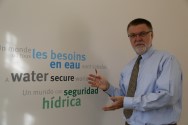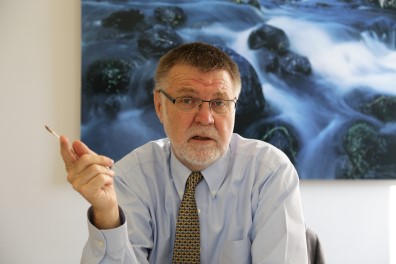 Rudolph Cleveringa has been working at the GWP global secretariat in Stockholm, Sweden, since September 2014. Prior to this, he spent over a decade working for the International Fund for Agricultural Development (IFAD) based in Rome, Italy – and throughout the years he has lived and worked in several countries and continents, mostly in jobs related to water and development.
Rudolph Cleveringa has been working at the GWP global secretariat in Stockholm, Sweden, since September 2014. Prior to this, he spent over a decade working for the International Fund for Agricultural Development (IFAD) based in Rome, Italy – and throughout the years he has lived and worked in several countries and continents, mostly in jobs related to water and development.
“In the late 60’s I read a pocket book about water and development by a French author. This triggered my interest in water and led me to study agro-hydrology and engineering. Later I switched from engineering to social engineering, because I wanted to understand what made projects work for people in the context of the countries where I was living.”
In the “lost decade of the 90’s” – as he calls it – Cleveringa left the water sector to work with rural development issues, explaining that at the time, “the institutional framework to work with water issues was siloed and didn’t allow for a holistic approach. Dublin 1992 brought that to a point.”
In 2003 he was back in the water world as IFAD offered him the opportunity to work on rural development with a focus on water and land governance. It was around this time that he became interested in the concept of Integrated Water Resources Management (IWRM) and with that GWP: “I was always interested in the IWRM “bazaar”, i.e., the dialogues and discussions that constantly goes on between the many stakeholders in order to find a consensual solution.”
GWP and the Future
 Today he is planning for GWP’s future role in helping countries implement the 2030 Agenda, particularly the water related Sustainable Development Goals (SDGs).
Today he is planning for GWP’s future role in helping countries implement the 2030 Agenda, particularly the water related Sustainable Development Goals (SDGs).
“It is a very fragmented water community out there. It is highly diverse and everybody wants to lead – it has become an overcrowded space. This needs to be re-structured”, says Cleveringa.
“This is where GWP can come in: to act as a bridge between the many sectors, banking on the credibility we have achieved over the first 20 years through our key role in bringing IWRM to the siloed water agenda.”
But to do this, GWP also has to change: “We need to get out of our comfort zone, out of the status quo, even more so than we already have. We need to reach out to other sectors – energy, agriculture, environment, we need to think about peace and stability, migration, and jobs. We need stronger support to and from the Country Water Partnerships, who in turn need to push for stronger engagement from local partners. To implement the SDGs, we need our partners to contribute on the local level.”
Cleveringa says it will be a balancing act to restructure the network priorities. While GWP may be known as a player on global agenda-setting – and should continue to be – reprioritization should focus on informed country action. Deciding on issues to pursue is another balancing act of this change agenda. “There is a risk of engaging on too many fronts, so we need to be careful about where to target our efforts – on transboundary, water and climate, the nexus, and integrated urban water management are all important to us, and within them, gender and youth.”
To articulate the aim and vision of the change process, a GWP Strategic Position Paper was recently sent to all partners. This was a direct follow-up on the SDG Preparedness Facility that GWP announced in September 2015, as the SDGs were adopted at the UN General Assembly. It was a key moment in GWP’s history, a day when the network could declare success in its long campaign to have a dedicated water goal on the development agenda.
“The Strategic Position Paper articulates our common GWP goals, and is co-owned by all Regional Water Partnerships and Country Water Partnerships. It sets out our ambitions for the 2030 Agenda,” explains Cleveringa.
World Water Day 2016
As work continues to strengthen GWP’s role in the 2030 Agenda, the network is also preparing to celebrate the annual World Water Day, which this year puts focus on water and jobs. Cleveringa says it is an important day, to use as a means to underpin water’s importance to society and livelihoods: “It is a day to commemorate and celebrate. Let’s use it to give the floor to people who normally don’t get their voices heard. This is something GWP is very supportive of.”

